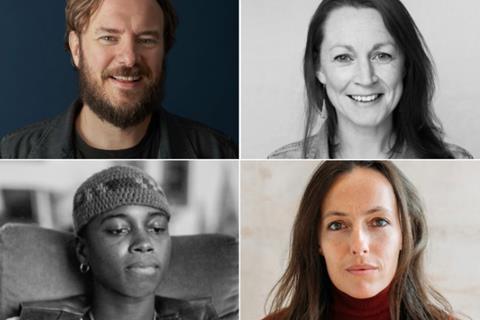
The Uncertain Kingdom, the UK feature development fund and shorts commissioner is celebrating its fifth anniversary with a more structured way in which it supports films as the UK heads into a possible general election year in 2024.
The development fund is committing to two rounds per year in a fixed calendar slot after previously operating on an ad hoc basis, Its next round opens on November 1 and closes on November 30, before opening again on May 1 and closing on May 31. Funding is divided between two to four projects per round, strictly for features with a theatrical ambition, with the team receiving around 75 applicants per callout.
Don’t Knock The Afro Rock was supported in the most recent round – a feature documentary directed by Matt Kay and produced by Lucy Draper and Rory Calder about Britain’s first Black rock band, who disappeared without a trace. Henry Blake also received a support for the featureThe Golden Radiance Of A Beetle, produced by Victoria Bavister and Denzil Monk, about a Chinese dock worker in 1919 and an English woman who fall in love, but find societal hatred transmogrifies her into a beetle.
For the next round of feature development funding, there is also change in the wording of the brief. “Our most frequent reason for turning down an application was this recurring problem where people were giving us an issue, rather than a story,” says the fund’s development executive Georgia Goggin, a producer whose credits include Pretty Red Dress. The wording has been softened, from backing “filmmakers whose work interrogates British culture; asking who we are, how we got here and where we are going” to supporting “British cinema by funding filmmakers whose stories tell us about ourselves.”
There is also a desire to encourage greater participation from filmmakers based outside of London and the south east. “We’ve got a bit more capacity now, so we’re going to start gathering equality, diversity and inclusion data, and one of the things we are going to ask about is what region our applicants are coming from, and crucially, the difference between where they started their life and where they are now,” says Goggin. “We want to know how strong the draw is to London.”
The team is keen to encourage more fiction filmmakers to come forward. “[We get] a lot of documentaries,” says Myah Jeffers, also development executive. “Perhaps people don’t feel they have the permission to really explore the story as a fictionalised version.”
Since The Uncertain Kingdom launched in 2018, its feature development fund has given out £125,000, with up to £60,000 awarded per round. It began as an ensemble of short films providing a spectrum of perspectives on life in the UK in 2019. A total of 21 short films were made in The Uncertain Kingdom’s first incarnation, including short films from Molly Manning Walker, Hope Dickson Leach, Antonia Campbell-Hughes, Ray Panthaki, Runyararo Mapfumo and Rebecca Lloyd-Evans. The Covid-19 pandemic thwarted plans for a theatrical release by Verve Pictures, with the films released online in June 2020.
The fund has again commissioned a series of shorts to chime with 2024 being a probable general election year in the UK. It will award £20,000 per short, and commission five films under the banner ‘belief’, which Verve will release theatrically in 2024.
”It’s a privilege to be able to be one of the people who gets to say yes to filmmakers”
John Jencks of UK outfit Electric Shadow Company, whose credits include producer on The Crow, director of The Hippopotamus and as an executive producer on Boiling Point, set up The Uncertain Kingdom following the announcement of Theresa May’s ‘festival of Brexit’ in 2018. “It went into my ears and fell like a lead stone through my heart,” he recalls.
Jencks wanted to give filmmakers the opportunity to have their say on the UK condition, but conscious of the time and funding constraints of feature films, he decided to set up a £200,000 short film initiative, with Goggin and Electric Shadow Company’s head of development Isabel Freer on board as development executives from the start.Jeffers has recently rounded out the team.
In 2021 the fund moved away from shorts to champion feature development. Jencks notes, “At that moment, there was a complete dearth of people funding development, that are non-institutional.”
There was also a consciousness of a steep drop-off of debut filmmakers making their second or third features. “We decided to tailor the fund looking at second time, or later, filmmakers,” adds Goggin.
The Uncertain Kingdom is self-funded by Jencks. “I could have had a bigger house, but I want to do this,” he says.
The fund does not take a share in copyright on the projects, but does outline that development funds will be returned in full when the project goes into production together with a premium if the budget of the film is £1m or more (a 10% premium for budgets between £1m - £5m and a 50% premium for budgets in excess of £5m), and 1% of the net profit of the film. The fund is not looking to build up its scale with public or institutional funding, and prefers to remain nimble.
Filmmakers can call on the team to be as involved or hands-off as they would like them to be. Goggin notes: “It’s really what that project needs – we’re led by them.”
It also supports development costs including writer and producer fees, research and workshops. “It’s such an incredible pleasure and privilege to be able to be one of the people who gets to say to filmmakers – your rent is paid for a period of time,” beams Goggin.






![The Brightest SunScreen[Courtesy HKIFF]](https://d1nslcd7m2225b.cloudfront.net/Pictures/274x183/3/5/0/1448350_thebrightestsunscreencourtesyhkiff_312678.jpg)


















No comments yet